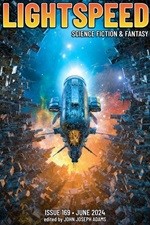“Sparrow and the Parasol” by Varsha Dinesh
“The Waking Sleep of a Seething Wound” by Dave Ring
“An Otherworldly Cat Tells You the Secrets of the Universe” by Megan Chee
“Udo Gehler and the Virgin Bitch of the Resistance” by Andrea Kriz
“In the Hands of the Mountain God” by Deborah L. Davitt
“The Help Hotline” by Dominica Phetteplace
“The Weight of Salt” by Shanna Germain
“Warning Notes from an Annihilator Machine” by Oyedotun Damilola Muess
Reviewed by Mike Bickerdike
“Sparrow and the Parasol” by Varsha Dinesh is a fantasy short story, with more than a hint of horror. Sparrow, god of Unsavory Characters and Underhanded Methods, shares the city with hundreds of other minor gods. She is recruited by a client to attempt assassination of the city’s ruling god and to this end, she undergoes dreadful tortures to transform her body at the hands of three ‘aunties’. It’s certainly full of colourful imagery, though much of it is rather gruesome. The end is quite satisfying, though not hard to guess in advance.
“The Waking Sleep of a Seething Wound” by Dave Ring is flash fiction SF. You know a story is unlikely to offer much subtlety or novelty when the third sentence is a colloquial cliché (‘She was too old for this shit’). Indeed, this short tale about subatomic particle phase order operatives (don’t ask, I couldn’t tell you) depends almost entirely on attitude. The author tries to cram so many ideas, backstories and events into such a short tale that it struggles to present a cohesive or focussed theme.
“An Otherworldly Cat Tells You the Secrets of the Universe” by Megan Chee is fantasy flash fiction. The premise here is that cats exist on every world in the universe and unbeknownst to humanity are sentient and all-knowing. This has a suggestion of Douglas Adams’ mice from the Hitch-hikers Guide to the Galaxy about it, but without the wit or insight.
“Udo Gehler and the Virgin Bitch of the Resistance” by Andrea Kriz is an SF novelette, replete with technobabble and choppy incomplete sentences. The plot follows Udo, a final year ‘ARMOR pilot’ student, who controls a military robot of sorts in a manner reminiscent of the Avatar films. To descend into a ‘void’ to control their ARMOR avatars, pilots need to have a connection to an ‘epigenesis core’, which seems to be the soul of the user’s mother. This technology is not very clearly explained and is rather hard to follow. The characterisation is a little thin and the motivations and concerns of the protagonist are hard to discern, all-in-all making for a rather challenging read.
“In the Hands of the Mountain God” by Deborah L. Davitt is a fantasy short story. A woman has lost her family, including her son, and full of grief she undertakes a trial to climb a mountain to visit a mountain god. Her motivations are several and somewhat confused, but as in real-life, this confusion and uncertainty rings true, and her inner turmoil is quite well laid out. The tale revisits a common theological argument–why should one revere a god who has let one’s family and friends perish? However, it manages to avoid being another trite treatment on the well-worn theme, as the story finds some new ground, doesn’t preach, and ends with a satisfying fantasy idea.
“The Help Hotline” by Dominica Phetteplace is SF flash fiction, and it’s really rather good. A man asks his wife for a divorce following a strange Zoom call with a work colleague. It seems he’s been the subject of a neuroscience experiment with a difference. The idea is very good—albeit not entirely novel—but manages to explore a lot of cultural territory in a short space, and is recommended.
“The Weight of Salt” by Shanna Germain is fantasy flash fiction. A woman is transformed to good by magical sea creatures, once she realises that she believes in them. Who or what the creatures are is left to our imaginations, which may be either cool or frustrating depending on the reader’s taste.
“Warning Notes from an Annihilator Machine” by Oyedotun Damilola Muess is a tongue-in-cheek SF short story, in which an alien machine sends emails to a young gamer on Earth to warn him of imminent—and then ongoing—extermination of the planet. The tale is told in a light, humorous way, and results in a story one might describe as Mars Attacks meets the The Last Starfighter, given the boy is selected by the alien machine based on his skill at gaming. This is a satirical piece, and once one gets used to the style and language it is quite enjoyable. However, it is the first piece of SF I’ve read in which an alien intelligence uses the 70’s slang expression ‘humongous’—I’m not sure if this a plus point or not!
More of Mike Bickerdike’s reviews and thoughts on science-fiction can be found at https://starfarersf.nicepage.io/
 Lightspeed
Lightspeed